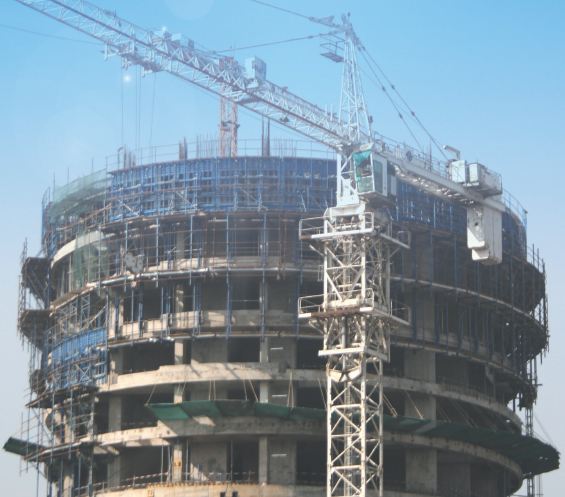Top Stories
MAKAAN DEMAND




The new government with a clear majority has come at the right time. Even as the Sensex and other parameters of the economy have zoomed, the electoral verdict, among other things, and growth of the construction sector in the country.
“There is hope that the government will create new structural reforms, including strict governance for infrastructure bottlenecks and reduction of red tape,” says Thomas Rookmaaker, director, Sovereign Ratings Group, Fitch Ratings.
” We hope that with such a resounding mandate,the NDA government will be well disposed to take firm and decisive policy decisions for removing various bottlenecks dragging the economy in general and real estate sector in particular to propel the growth. As BJP’s manifesto has promised housing for all, we look forward to work with the government in achieving that goal,” says Rohit Raj Modi, officiating president, Credai-NCR.
Despite the realty sector being in the rough for quite some time, developers have charted and explored newer corridors to invest their capital in. To name a few, such corridors, Sohna and NH-24 in Delhi-NCR, Ulwe and Karanjade in Mumbai, Hennar Road in Bangalore, etc. have shown remarkable resilience and have developed many a lower-priced project for buyers.
At the same time, the country’s residential sector is still passing through an interesting phase. According to a recent report by international property advisor, JLL, while supply is showing variable signs of cyclical ups and downs depending on launches, the demand is showing a slowing curve in NCR -Delhi, but stable in all other cities, primarily on the back of new launches in emerging residential corridors which have been successful in attracting buyers.
“On the supply side, affordable and lower-priced residential corridors such as Greater Naida and NH- 8 (NCR-Delhi), western suburbs and T hane (Mumbai), Whitefield and Hosur Road (Bangalore) and southern suburbs (Chennai) were the prime drivers of the new launches. On the demand side, while NCR-Delhi contributed over one-third of the total new launches, its share of net absorption dropped from above 40 per cent to just over 36 percent by the first quarter of 2014,” says the JLL report.
There is sense that the Land Acquisition Act, which came into force from January 1 this year, will make it even more difficult to bring about the much required investments, as land prices are expected to triple in the coming days, and approvals to become more complex for the industry
Despite the realty sector braving tough times, developers have explored newer corridors to grow their capital in the recent past. To name a few, Sohna and NH-24 in Delhi-NCR, ULwe and Karanjade in Mumbai and Hennar Road in Bangalore have shown a remarkable developments to offer lower priced projects to buyers.
The country currently requires 18.78 million additional houses, of houses, of which 95.62% are in the economically weaker section (EWS)/lower income group (LIG)/middle income group (MIG): ASSOCHAM


ANUJ PURl, Chairman & Country Head, JLL India


ROHAN SHARMA, Senior Manager (Research & REIS), JLL India
What the new Govt needs to do
• The new government should ease the conditions for FDI in real estate and reduce minimum capital requirement from $10mn to $5 and minimum tenure before repartition from 3 years to 1 year
• It should give an infrastructure status for the affordable housing sector to attract more capital and investment formation
• The much sought after housing regulator should be in place to monitor all dos and don’ts in the sector
• For transparency in all aspects,there must be digitization of land records in all states
• Insurance/pension funds need to be allowed to invest in the affordable housing sector
• Tax exemption on income derived by an undertaking, engaged in development and construction of smaller dwelling units
• Review/repeal Sec 43C in the Income Tax Act on taxation at circle rate and restore 80 IB (10)
• Impetus to the essential infrastructure at the outskirts of tier/tier II cities to ensure affordable housing clusters are well connected and cities are congested.
As India’s housing shortage is legendary, and the government has always kept low-cost housing in focus, most developers have shied away from focusing on this space because affordable housing is a relatively low-margin business and in high inflationary scenario, profitability remains a key concern. Equity participation by private equity (PE) funds has also been limited in the budget housing space. Therefore, a strong initiative is required of the new government to heal the sector.
According to a survey by one of the leading industry chambers, ASSOCHAM, the country currently requires 18.78 million additional houses, of which 95.62 per cent are in the economically weaker section (EWS)/ Iower income group (LIG)/middle income group (MIG).
What buyers want from the new government?
• The government should review housing loan schemes and provide low interest rates to the buyers/investors.
• There Should be a mandate for the developers across country to construct EWS/LIG units and authority to create enabling environment with increased floor area ratio(FAR)
• Need to develop a full proff mechanism for rental housing and ensuring implementation of REITs & REIMs under the same
• There should be availability of higher FSI with relaxed density norms for affordable housing projects
“The new government may look at helping on quicker land acquisition, faster approvals, easy and low-cost funding availability and better infrastructure to make it a more interesting proposition for developers and investors / buyers. In Gujarat (the home state of Narendra Modi), the government has been extending a helping hand to developers who construct low-cost homes, although availability of cheap capital, lengthy approval process and affordable land availability continue to remain challenges,” says Anuj Puri, chairman and country head, JLL India .
As foreign money has been waiting in the wings and awaiting political stability before entering India. Experts and developers are hopeful that now foreign fund will keep flowing into the domestic real estate sector
However, Rana Kapoor, president, ASSOCHAM, believes that India is at the crossroads of experiencing rapid urbanisation in the current decade. Addressing the concerns of affordable housing is the need of the hour, he says. “Given the slowdown in the real estate sector, additional HNI investments in the sector at high interest costs and the increase in ready reckoner rates by some state governments, will only push up property prices further. Taking adequate and appropriate measures to increase affordable housing alternatives will not only create a GDP multiplier, but also improve the living standards of Indian citizens.”
As the infrastructure and real estate sector occupy a big pie in the country’s growth, an improvement can definitely be expected in the near-term investment sentiment. This will have an impact on the investment growth within the GOP.


Sachin Sandhir, MD, RICS South Asia


ROHIT RAJ MODI, Officiating President, Credai-NCR


RANA KAPOOR, President, ASSOCHAM
The JLL report says: “As a testimony to that, industrial GD P (comprising of investment-heavy sectors such as mining, manufacturing etc.) is forecast to grow at 3.5 per cent year-on-year (consensus of professional forecasters empanelled by the RBI) during the current fiscal year 2014-15 as opposed to an abysmal 0.6 percent year-on-year in the previous fiscal year.
As for the investment in the sector is concerned, investors clearly suggest that domestic money is in the search for good investment options; investors are eager to strike a deal at attractive valuations. However, foreign money has been waiting in the wings and awaiting political stability before entering India. In that respect, a clear majority is the best possible scenario.
Earlier experts were thinking that most investors were comfortable with a government with minor alliances as long as there was a clear agendas and strong voice dictating those agendas. But things have changed now. “What investors are looking for in a ruling government is clear goals and the will and strength to achieve them,” adds Puri
What developers want from the new Government?
• The government should review RBI norms for project finance; uniformity in the end user income ceiling norms for affordable housing units for EWS and LIG.
• There should be rationalization of direct and indirect taxes in the real estate industry to enable competitive pricing for the end user.
• There should be single window clearance mechanism for housing sector in the country.
• Need to incentive low cost and innovative technologies such as prefab for producing large volumes of affordable housing units.
In the recent past, infrastructure projects planned and underway were positioned as pull factors for residential projects launched in the vicinity of such infrastructure developments. New highways and the Metro connectivity also raised the attraction quotient for upcoming locations. But unfortunately, the buyer/investor’s sentiment remains weak given the high interest rates and rising residential prices.
“Investors have become cautious and are investing in select projects, and by staying away, they have affected investor-driven, speculative residential markets. Buyers have become fence sitters, waiting for economic headwinds to improve and better credit conditions,” says Rohan Sharma, senior manager (Research & REIS), JLL India.
On the other hand, developers have been taking a wait-and-watch stance, holding the prices. They have shown more flexibility in offering discounts and are looking towards proactive policy changes. They are also targeting emerging corridors for low-ticket project launches. Keeping their sentiments in mind, will the government be able to drive their thought into reality?
FDI IN REALITY
With a view to protect the interest of small and medium retailers and SMEs, the new government’s manifesto has more or less conveyed its resistance to opening up foreign direct investment (FDI) in certain sectors.


RK ARORA, CMD, Supertech


DHIRENDRA GABA, CMD, Fair wealth Housing


ANIL MITHAS, CMD, Unnati Fortune Group


SHIVAKSHI GOGIA, CFO, Ascent Group


DAVID WALKER, ED, SARE Homes


AKTULSIANI, CMD, Tulsiani Constructions & Developers


KAMAL DUTTA, MD, DPL Group


NEERAJ GULATI, MD, Assotech Realty
Recently, ASSOCHAM had also urged the new government to ease the conditions for FDI in real estate and reduce minimum capital requirement from $10 mn to $5 mn and minimum tenure before repatriation from 3 years to 1 year. But as per JLL study, retail is in the negative list as per the manifesto; however, if the country has to welcome FDI and international investors, it might need to consider the number of international retailers waiting on the side-lines in wait-and-watchmode.
“A few retailers have already announced their plans to go ahead with the cash and carry model of operation in India, therefore kick-starting a new cycle of investment in retail. The overall FDI policy will be conducive, as the new government is committed to promote FDI in other sectors and also to reforming the Foreign Investment Promotion Board (FIPB) functioning to make it investor friendly,”says Puri.
As foreign money is the most sought-after wealth for future India, experts and developers are hopeful that now foreign fund will keep flowing into the domestic real estate sector.
“Any stable market that promises more transparency in processes, transactions and healthy returns has the potential to attract funding. India too has the potential to deliver quality investment grade real estate that not only promises growth but also promises healthy returns to its investors. With some of the proposed reforms such as the introduction of real estate investment trusts (REITs), the market will then provide an investment avenue in quality real estate within the country,” says Sachin Sandhir, managing director, RICS South Asia.
Regulatory Bottleneck
In a bid to end red-tapism and bring out transparency in the realty sector, the draft Real Estate (Regulation and Development) Bill-2011 has proposed to set up a real estate regulator. With a buzz in the air that transparency and good governance will bring the sector to a trust level for one and all, industry insiders are hopeful that setting up a real estate regulator may be the new government’s priority.
However experts believe that the new government will definitely boost employment and growth in the next 12 months period if it works towards the betterment of the sector by removing the regulatory bottlenecks in the way of project approvals and bring pending reforms such as real estate regulation.
“The Real Estate (Regulation and Development) Bill 2011 has been pending before Parliament from a long time. I do believe that the government should bring such reforms at a priority. Disclosure norms envisaged under the regulation will improve investments into the sector and help consumers in a big way. While consumers will then have all information on a particular project, the Appellate resolution,” says Sandhir.
It is likely that the new government will take up the legislation afresh wherein the developers are much hopeful with their concerns and expect it can be addressed favourably.
Land Acquisition Woes
There is sense that the Land Acquisition Act. which came into force from January 1 this year, will make it even more difficult to bring about the much required investments, as land prices are expected to triple in the coming days, and approvals to become more complex for the industry. Considering that the land bill was passed with majority support, including by the BJP. the industry may find it increasingly difficult to acquire land, which will cause inordinate delays for the projects that can cause massive cost overruns


ANIL KUMAR, JMD & CEO, Ansal API


NEERAJ MISHRA, Director, Praxis Group


VIKAS GUPTA, JMD, Earth Infrastructures


ARVIND SINGH, MD, KRasa Group


GAURAV GUPTA, General Secretary, Raj Nagar Extension, Association & Director, SG Estates


AJAY SINGAL, Director, Avalon Group
-



 News3 weeks ago
News3 weeks agoNoida’s High-Rise Societies Face Multiple Challenges Despite Rapid Urban Growth
-



 News3 weeks ago
News3 weeks agoOlive Announces Dhruv Kalro as Co-Founder
-



 News4 weeks ago
News4 weeks agoGodrej Properties Sells 5000+ Homes of Rs 9.5 cr in Q4FY24, Bookings up 84% YoY
-



 News4 weeks ago
News4 weeks agoVestian: Domestic Investors Dominate Institutional Investments in Jan-Mar’24
-

 News3 weeks ago
News3 weeks agoIndia to become the fastest-growing silver economy, housing up to 17% of the world’s elderly population by 2050: CBRE Report
-



 News4 weeks ago
News4 weeks agoHRERA Gurugram Rejects Godrej Properties’ Project Extension Application, Account Frozen For Prolonged Non-compliances
-



 News2 weeks ago
News2 weeks agoSKA Forays In Luxury Housing: Launches SKA Destiny One in Greater Noida, To Invest Rs 592 Crores
-



 News4 weeks ago
News4 weeks agoAshiana Housing Sells Rs 440 cr Worth 224 Flats at its Project Amarah in Gurugram
























